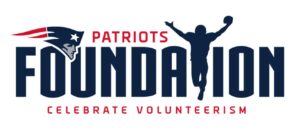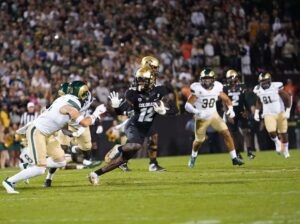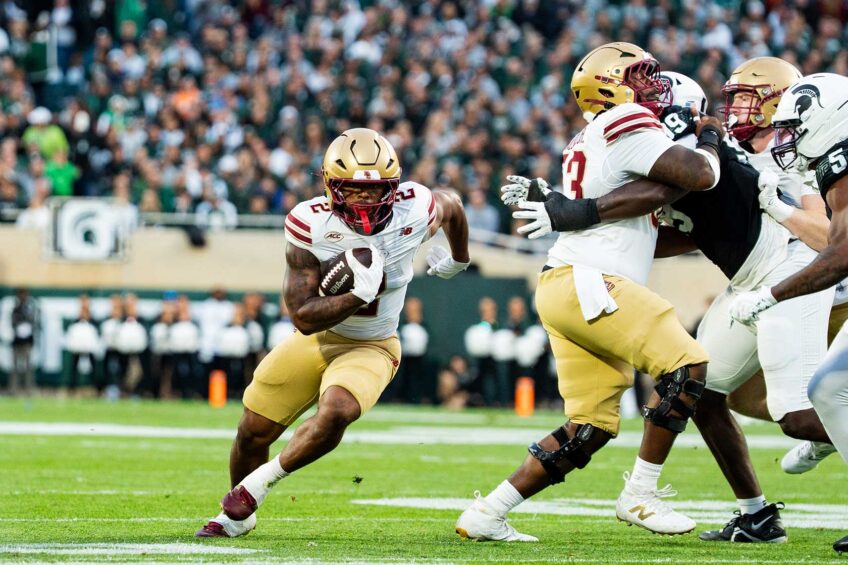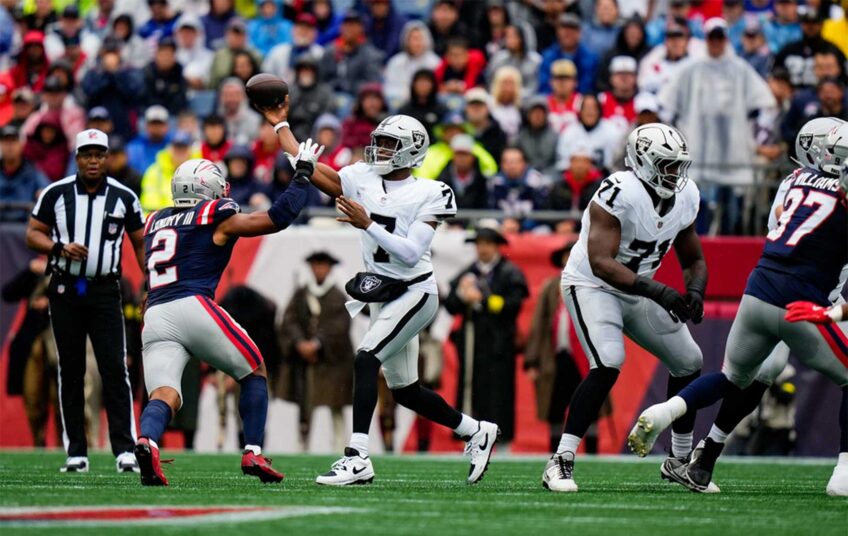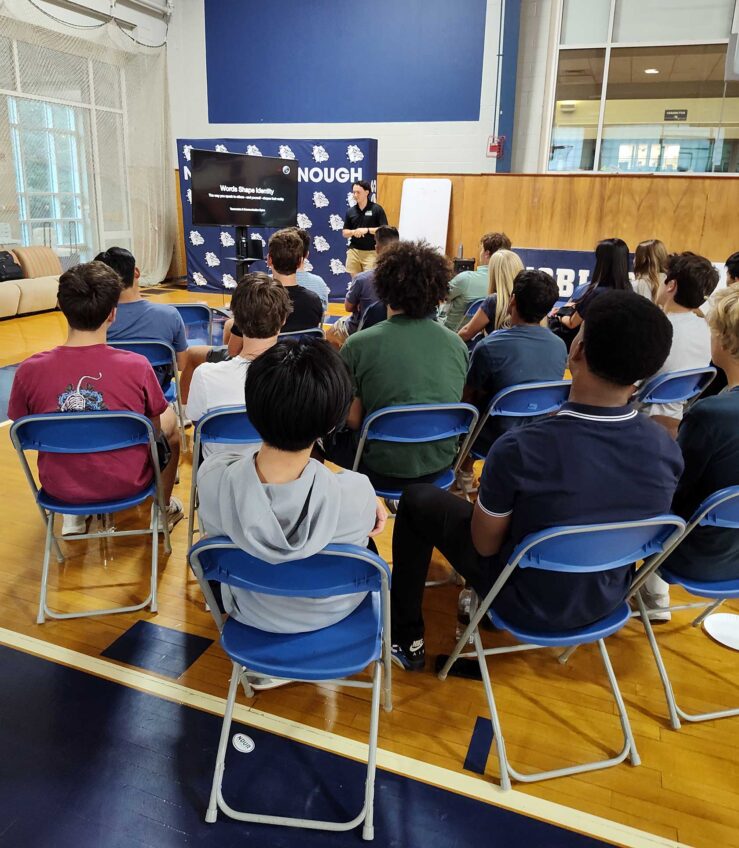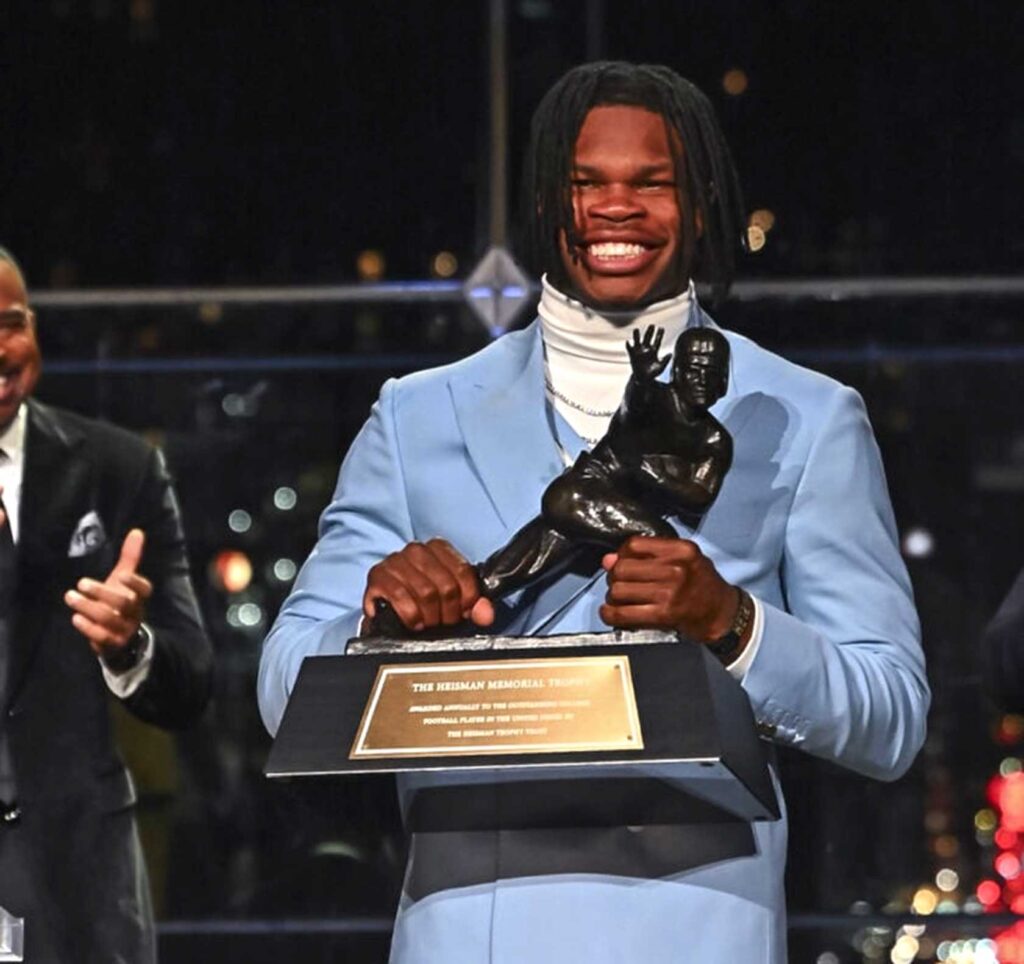
Banner Sports Sponsored by the Patriots Foundation
This year’s Heisman Trophy race was over midway through this college football season. Travis Hunter, the spectacular two-way player for the University of Colorado, a preseason favorite, took an early lead and distanced himself from the competition. In the words of his flamboyant coach, Deion “Primetime” Sanders, “It was no contest as to who was the best player in college football this year. Travis left no doubt in the minds of voters with his stellar on-field performance.”
Hunter thus becomes the 39th Black man and fifth straight player to hoist the Heisman Trophy. He shared his Heisman moment with Boise State running back Ashton Jeanty, Oregon quarterback Dillon Gabriel, and University of Miami quarterback Cam Ward. This was the first time in Heisman history that four players of color took center stage on Heisman night.
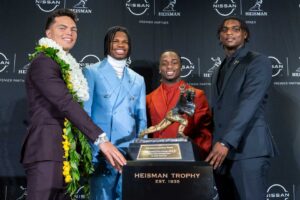
Heisman Memorial Trophy finalists (from left) Oregon’s Dillon Gabriel, Colorado’s Travis Hunter, Boise State’s Ashton Jeanty and Miami’s Cam Ward. PHOTO: THE HEISMAN TRUST
Dillon Gabriel, another finalist, is Native American. But the evening and spotlight belonged to Travis Hunter, who became the first two-way player since Charles Woodson of the Michigan Wolverines won in 1997. Woodson was a national champion and the first defensive player in college football history to join the Heisman Trophy family. He also ran plays on the offensive side of the ball.
Hunter’s statistics were mind- boggling. His 92 catches with 14 touchdowns, 31 tackles, and four interceptions made his selection a no-brainer for the Heisman voters. Ernie Davis, the prolific Syracuse running back, was the first Black Heisman Trophy winner in 1961. He was slated to play alongside the immortal Jim Brown in the Cleveland Browns backfield. Some say Brown was robbed of the Heisman honor, finishing fifth in the voting to Notre Dame’s Paul Hornung in 1956. Hornung is the only player in history to win the award, playing for a losing team.
However, Davis never lived out his dream of playing with Brown, who helped recruit him to Syracuse. He would die of Leukemia, never playing a single game in the National Football League. During an interview in the 1970s, Jim Brown explained, “One of my greatest disappointments was not getting a chance to play alongside Ernie Davis in the Cleveland Browns backfield. I believe we would have made magic together and would have gone down as one of the NFL’s all-time great running back tandems. He was that good a player and an even better human being. I remember crying a lot of tears the day Ernie Davis died.”
From Ernie Davis to Travis Hunter, the Heisman Trophy has been handed to some of history’s greatest Black football players. Diminutive Southern California running back Mike Garrett in 1964 was the second Black player to win the Heisman. He was also the first Black Heisman recipient to play on a Super Bowl-winning team, scoring a touchdown on one of the iconic Super Bowl plays: the 65 Toss Power Trap for the 1970 Kansas City Chiefs. USC became known as “Tailback U.” with fellow Trojans O.J. Simpson in 1968, Charles White in 1979, and Marcus Allen in 1981, all winning the award. The school has the most recipients, with eight.
Travis Hunter will now head to the National Football League with questions about whether he will play defense, offense or both. Critics point out that he will elevate to an injury risk factor if he attempts to be a two-way performer in the NFL. But young Mr. Hunter is leaving all his options open. He said, “I just want to play in the National Football League. I am prepared to play wherever I am needed to help my team win games,” following his magical evening on the Heisman Trophy stage.
It will be fascinating to see how his NFL career turns out. Time will tell.
NFL talent evaluators are quick to tell you that Hunter has that “It” factor that could lead him to stardom in the league. Those same people question his size, 6’1” and 185 lbs., and the fact that he has already suffered major injuries in his college career. A serious lung injury last season put him out of action for a significant period of time.
Hunter explained, “I played pretty much injury-free this season. Football is a tough game, and every player suffers injuries. I will go into the NFL in the best shape of my life and pray for good health.”
If young Travis Hunter’s health prayers are answered, look for him to be a major impact player from the moment he steps on an NFL Field.
According to his Hall of Fame coach, he possesses that type of talent. He said, “The sky’s the limit for Travis Hunter. Let’s sit back, watch, and see how high he flies.”
Time will tell. But one thing is certain. Whenever the Heisman Trophy roll call is taken, Travis Hunter’s name will be called.
Historical Note: The Heisman Trophy is named after John Heisman (1869-1936), who played as a lineman at Brown and Penn and coached American football at 11 colleges, baseball and basketball, as well as being a sportswriter and actor.

